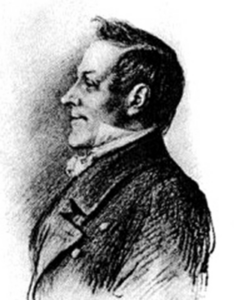Sleep-song
(Poet's title: Schlaflied)
Set by Schubert:
D 527
[January 1817]
Es mahnt der Wald, es ruft der Strom,
“Du liebes Bübchen zu uns komm!”
Der Knabe kommt und staunend weilt,
Und ist von jedem Schmerz geheilt.
Aus Büschen flötet Wachtelschlag,
Mit irren Farben spielt der Tag;
Auf Blümchen rot, auf Blümchen blau
Erglänzt des Himmels feuchter Tau.
Ins frische Gras legt er sich hin:
Läßt über sich die Wolken ziehn,
An seine Mutter angeschmiegt,
Hat ihn der Traumgott eingewiegt.
The forest exhorts, the river calls out,
“You dear kid, come to us!”
The lad comes and stays there amazed,
And he is cured of each of his pains.
The song of quails can be heard coming from the bushes,
The day plays with crazy colours;
On little red flowers, on little blue flowers
Glistens the wet dew of the sky.
He lies down in the fresh grass
And allows the clouds to float over him –
Cuddled up to his mother,
The god of dreams has rocked him to sleep.
All translations into English that appear on this website, unless otherwise stated, are by Malcolm Wren. You are free to use them on condition that you acknowledge Malcolm Wren as the translator and schubertsong.uk as the source. Unless otherwise stated, the comments and essays that appear after the texts and translations are by Malcolm Wren and are © Copyright.
☙
Themes and images in this text:
Blue Bushes and undergrowth Clouds Colour (general) Dew Dreams The earth Flowers Grass Heaven, the sky Here and there Lullabies Mother Nature Pain Quails Red and purple Rivers (Strom) Rocking Sleep Serenades and songs at evening Soothing and healing Woods – large woods and forests (Wald)
Everything is strangely animated: the forest is offering advice, the river is calling out, the day is playing with odd colours. Despite all of this strange activity the atmosphere is calm and soothing. The boy comes to a halt and feels his pain fall away. The heavenly realm comes down to earth: birds sing in the undergrowth rather than in the sky, the dew on the red and blue petals has fallen from heaven, and as he lies down in the inviting grass the lad can pay attention to the floating clouds up above him. Earth and the sky come together in this overarching experience of nature. Mother nature is not something static; the sounds and movements he experiences are like a mother speaking to her child and rocking him to sleep.
This is not the sort of nature poetry that opens our eyes to how the world works or inspires the sort of sensitivity that stimulates our senses or arouses a feeling of awe. Rather it offers solace to us as an escape from our human concerns, it takes us into a world of dreams, where the colours we encounter are crazily unreal (other than in our perception).
When we all finally snuggle down with mother earth, will we be similarly conscious of the absence of pain? Will the god of dreams continue to offer us illusions and fantasies or will everything go blank?
☙
Original Spelling Schlaflied Es mahnt der Wald, es ruft der Strom: "Du liebes Bübchen zu uns komm!" Der Knabe kommt und staunend weilt, Und ist von jedem Schmerz geheilt. Aus Büschen flötet Wachtelschlag, Mit irren Farben spielt der Tag; Auf Blümchen roth, auf Blümchen blau Erglänzt des Himmels feuchter Thau. Ins frische Gras legt er sich hin: Läßt über sich die Wolken zieh'n - An seine Mutter angeschmiegt, Hat ihn der Traumgott eingewiegt. Note on the text There are a number of differences between the text as set by Schubert and the version published by Mayrhofer in 1824. It is impossible to know if Schubert made these changes himself or if he was working from an earlier draft of the poem. The published version is as follows, with differences in bold. 'Schlaflied' has also appeared with the titles 'Abendlied' (Evening song) and 'Schlummerlied' (Slumber song) Es mahnt der Wald, es ruft der Strom: "Du holdes Bübchen zu uns komm!" Der Knabe kommt und staunt, und weilt, Und ist von allem Schmerz geheilt. Aus Saaten1 flötet Wachtelschlag, Mit irren Lichtern spielt der Tag; Und auf dem Blümlein in der Au Erglänzt des Himmels feuchter Thau. Ins hohe Gras legt er sich hin: Läßt über sich die Wolken zieh'n - An seine Mutter Erde angeschmiegt, Hat ihn der Traumgott eingewiegt. 1 Schubert: Büschen (bushes). Peter Rastl speculates that Mayrhofer probably corrected the text when it was pointed out to him that quails live in grass, not in bushes.
Confirmed by Peter Rastl with Gedichte von Johann Mayrhofer. Wien. Bey Friedrich Volke. 1824, page 47.
To see an early edition of the text, go to page 47 [61 von 212] here: http://digital.onb.ac.at/OnbViewer/viewer.faces?doc=ABO_%2BZ177450902


